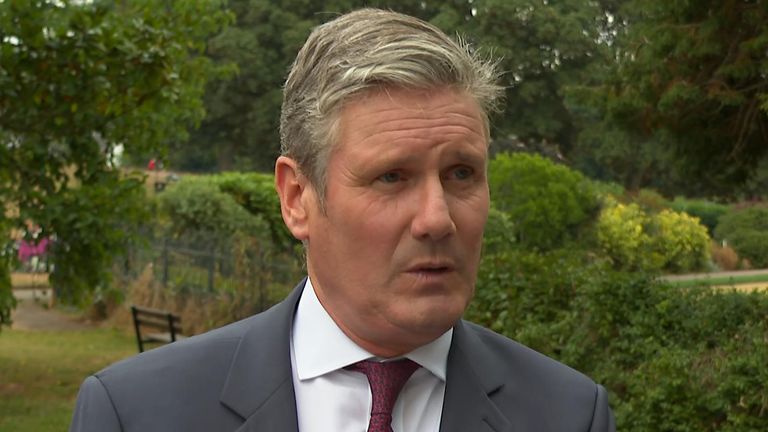Credit Starmer for having an energy crisis plan – but it’s a questionable short-term fix
Credit Sir Keir Starmer for at least trying to come up with a costed plan to tackle the UK’s burgeoning household energy bill crisis.
It’s more than Boris Johnson’s zombie government, or the two people vying to succeed him, have done.
That said, Labour’s proposals to freeze the energy price cap at the present £1,971 at best raise more questions than answers. At worst, they are deeply flawed.
Firstly, the arithmetic. Labour has costed its plan at £29bn for six months.
Is plan to stop bills rising this winter workable? – Cost of living latest
The lion’s share of this would come from the £14bn saved in not paying the flat £400-per-household rebate on energy bills the government is promising from October. That much is beyond dispute.
A further £8bn would come from backdating the government’s 25% levy on the profits of oil and gas producers in the British North Sea, announced in May by then chancellor Rishi Sunak, to January this year and by closing what Labour describes as the “absurd loophole” in the levy – the 91p-in-the-pound tax relief that the government is making available to oil and gas producers investing in new projects in the region.
The remainder would come from £7bn that Labour says would be saved by a reduction in interest payments on government borrowing as a result of the lower inflation that would ensue from keeping household energy bills down.
The latter two assumptions, though, are questionable. When Mr Sunak announced his windfall tax on the profits of North Sea oil and gas producers, he predicted it would raise £5bn over its first year, so Labour is clearly assuming an extra £3bn can be raised by backdating the tax to January and by scrapping the tax relief offered on new investments.
That assumption is doing some heavy lifting. It is very hard to say how much more this measure will raise.
Politicians – and some in the media – like to single out the global oil and gas giants like BP and Shell and, accordingly, much was made of the comments from Bernard Looney, BP’s chief executive, when he said in May that a windfall tax would not affect BP’s plans to invest £18bn in the UK during the rest of the decade.
But BP and Shell are big global companies and only a very small proportion of their profits are derived from the British North Sea.
The vast majority of production in the region these days is accounted for by companies less well-known to the public, such as the FTSE-100 newcomer Harbour Energy, Israeli-owned Ithaca Energy, UK-listed Serica Energy and Equinor, the Norwegian state-owned oil and gas producer.
The first three of those in particular are far smaller than the oil supermajors and far more dependent on the British North Sea – and their investment plans for the region are, accordingly, much more sensitive to windfall taxes.
Many of these companies, including Equinor, were already questioning their planned investments following Mr Sunak’s levy.
It is likely that the questioning would intensify were Labour’s proposals to see the light of day.
Read more:
What is a windfall tax and has the UK tried it before?
Who is proposing what to tackle soaring energy bills faced by struggling households?
As questionable are the assumptions being made about the interest payable on government borrowing. Yes, if inflation comes down as a result of household energy bills being capped, that would temporarily reduce an element of those debt interest payments.
But these proposals are only for six months – and so, when bills began to rise again, so would inflation and that component of the national debt linked to inflation.
As Paul Johnson, director of the independent Institute for Fiscal Studies, told the Daily Telegraph: “It’s an illusion in the sense that it will reduce interest debt payments in the short term but unless you maintain these kinds of subsidies permanently, it won’t reduce them later on. Inflation will be higher later on.”
Perhaps the biggest problem with Labour’s proposal though, is that this is only a short-term fix, seeking to alleviate pain for households in the immediate term.
There is nothing in it, by the way, for hard-pressed business consumers of energy – many of which could be forced over the edge by higher energy bills.
Moreover, there is nothing in these proposals to tackle the fundamental problems faced by the UK around energy supply and demand.
Subscribe to the Daily podcast on Apple Podcasts, Google Podcasts, Spotify, Spreaker
Capping household energy bills at the existing level will do nothing to bring down energy consumption or to encourage households to invest in energy-saving measures such as insulation, solar panels or heat pumps. Nor will it do anything to tackle the supply side of the equation.
Britain does not buy much gas from Russia, but it is now competing for gas supplies with those countries that do, which is the main reason why wholesale energy prices are rising.
The biggest way of guaranteeing lower wholesale prices in the longer term is to either reduce energy demand or promote an increase in energy supplies.
These proposals do neither.
To that extent, they are reminiscent of George Osborne’s Help to Buy scheme, which propped up housing demand – if not to say boosted it – while doing nothing to increase housing supply.



